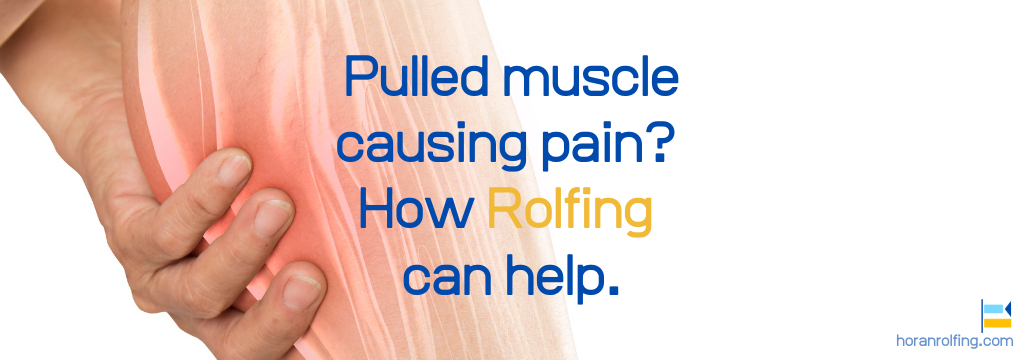What can Rolfing do for a pulled muscle?

How do your muscles get pulled in the first place? Muscle fibers stretch too far past normal working length, tearing muscle fibers. That causes what we’re most familiar with as a “pulled muscle.” It can be severe enough to keep you from working out like usual for weeks at a time. Let’s talk about recovery and Rolfing – because you definitely want to recover properly to get back to 100%.
How can Rolfing help you recover from pulled muscles?’
Usually, the first thing we want to do is try to stretch it out. The assumption is that we pulled it because it was too short. Here’s where understanding how one part of the body’s musculature and myofascial affect another part is so important.
For example, did you know a pulled hamstring may not have anything to do with your hamstring being short? Yep. It could be that a short quadricep is pulling your pelvis into a front tilt. Because your hamstrings attach to the back of your pelvis, your hamstring is actually being pulled too long! That means the last thing you want to do is stretch your hamstrings. Instead, you need to stretch – or lengthen – your quads.
Other reasons for pulled muscles: Poor habits & dehydration.
You may be thinking, “How could my quads get too short?” It all depends on how you’re using your body, from how you sit to how you work out. If an injury or a bad habit makes your muscles misfire – the sequence is off – then it’s a lot easier to pull a muscle.
Another reason for a pulled muscle is dehydration. You’d be amazed at how much it matters to your muscles that you’re well-hydrated, because there’s simply no elasticity in dehydrated soft tissue. Here, test yourself:
Pinch the skin right behind any knuckle on your hand. Did it flatten out right away? Excellent. Way to keep hydrated. Did it stay pinched for any time at all? You’re dehydrated – drink water now!
Remember, as little as 2% dehydration affects your mental alertness and physical performance. Get into the habit of checking your non-diuretic fluid intake. Caffeinated coffee, sodas, even green tea, causes more frequent urination. If you’re not balancing that out with healthy hydration, you’re placing your muscles – and your mind – at a disadvantage.
We’ll explore all possible reasons for your muscle pain during your initial examination when I evaluate your body mechanics. Our Rolfing sessions together are focused on getting your body – and how you use it – back into balance for the long term. That often means creating new habits and patterns. Let’s get started!
At Horan Rolfing, my goal is to help you move pain-free again. We’ll work together to restore your body’s ease, balance, and strength. Schedule a Rolfing appointment with me in the Tacoma location of Horan Rolfing or in the Bellevue office.
- Got a Pain in the Butt? Could be Sciatica.
- Fingers tingle or go numb? May (or may not) be Carpal Tunnel.